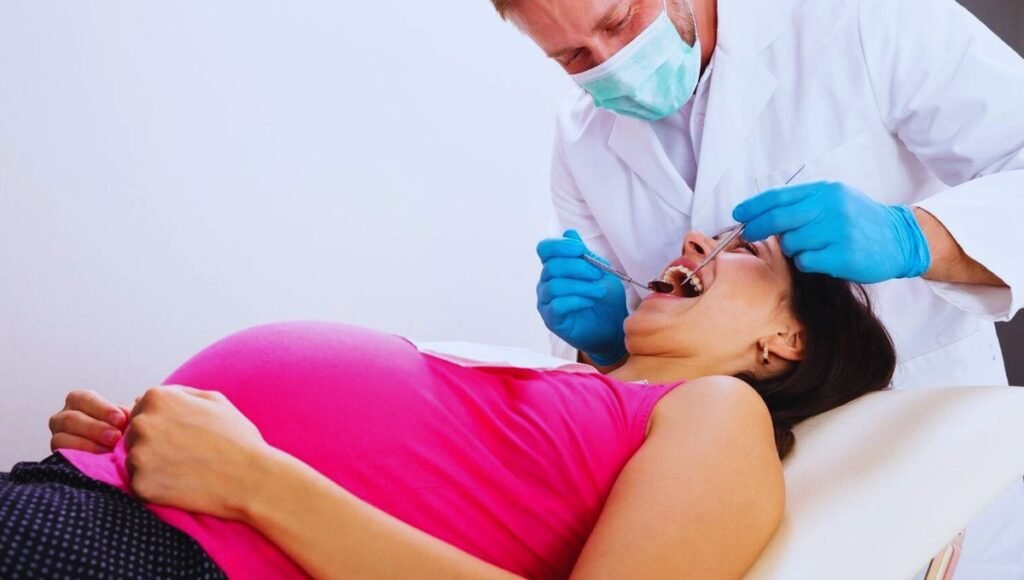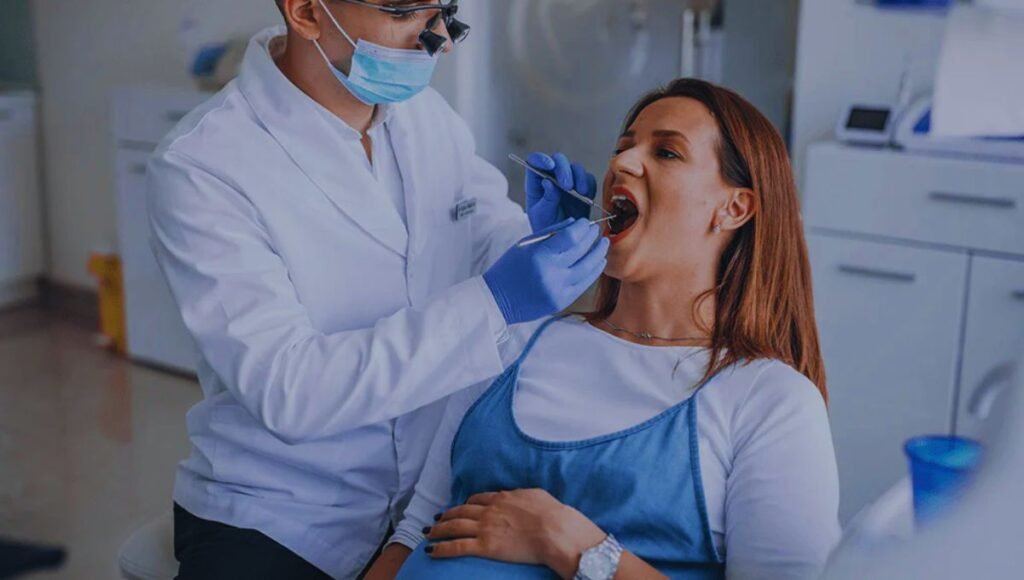Can I Fix a Chipped Tooth While Pregnant?
If you’ve chipped a tooth while pregnant, you’re likely wondering if it’s safe to have it fixed right away. You’re not alone in your concerns; many pregnant women hesitate before undergoing dental procedures. It is crucial to consult your dentist to evaluate the damage and discuss the safest treatment options available.
While minor repairs might be straightforward, more complex interventions may require careful consideration of timing and materials, ensuring they are safe for both you and your baby. Curious about what specific treatments are advisable during pregnancy and how to navigate this situation safely? Your dentist will have the insights you need.
Understanding Pregnancy Dental Care
When you’re pregnant, it’s important to stay on top of your dental health, as hormonal changes can increase your risk of certain oral conditions. Regular dental checkups are essential during this time. These checkups allow your dentist to monitor your oral health and manage any issues before they become severe. They’re not just looking for cavities; they’re also checking for signs of gum disease, which is more prevalent in pregnant women due to hormonal fluctuations that affect the gum tissues.
Maintaining good oral hygiene is equally vital. You should brush your teeth at least twice a day with fluoride toothpaste and floss daily. This routine helps prevent the buildup of plaque, which can lead to gum disease. Remember, the health of your mouth can directly impact your overall health and potentially, the health of your baby.
Your dentist might also recommend using an antimicrobial mouthwash to help reduce plaque and gingivitis. If you’re experiencing morning sickness, it’s a good practice to rinse your mouth with water after vomiting to protect your teeth from stomach acids, which can erode tooth enamel.
Scheduling regular checkups and keeping up with daily oral hygiene will significantly contribute to your dental health during pregnancy.

Risks of Dental Work During Pregnancy
You might wonder about the safety of undergoing dental procedures while pregnant, as certain treatments could pose risks to your developing baby. It’s important to think about how pregnancy impacts your oral health and the potential hazards of specific dental work during this period.
Firstly, hormonal changes during pregnancy can worsen dental problems, making you more vulnerable to gum disease and tooth decay. These issues, if left untreated, can lead to dental emergencies, which are a significant consideration.
However, some dental treatments, especially those requiring strong medications or X-rays, carry risks that could impact fetal development. The timing of treatments is crucial; the first trimester is particularly sensitive for fetal organ development, and dental professionals generally recommend postponing non-emergency procedures until the second trimester to minimize risks.
Moreover, the use of certain anesthetics and medications during dental procedures needs thoughtful evaluation. Some of these substances can cross the placenta and potentially harm your baby, depending on the dosage and type used.
Always make sure that your dentist knows you’re pregnant and discuss safer alternatives for managing pain and infections.
Safe Dental Treatments for Pregnant Women
Despite the risks associated with some dental procedures during pregnancy, many treatments are safe and can effectively manage oral health issues without endangering you or your baby. It’s essential to address common concerns about dental care during this sensitive time, ensuring both your peace of mind and continued oral health.
Safe procedures during pregnancy include routine dental cleanings and check-ups, which aren’t only safe but recommended. These regular visits help prevent gum disease, which has been linked to preterm birth and low birth weight.
Additionally, dental fillings and crown repairs are safe and important for maintaining tooth health and preventing infection. When performing necessary dental work, dentists often use local anesthetics that are safe for pregnant women, such as lidocaine.
X-rays, another common concern, are generally avoided during pregnancy, especially in the first trimester. However, if necessary, modern dental x-rays are extremely low in radiation and precautions such as shielding the abdomen and thyroid can be taken to further minimize any risk.
Steps to Repair a Chipped Tooth

Repairing a chipped tooth involves several key steps, starting with an assessment by your dentist to evaluate the damage. Depending on the extent of the chip and your stage of pregnancy, your dentist will recommend the safest and most effective treatment plan. If it’s a minor chip, you might need only a simple polish to smooth out the tooth. More significant damage may require bonding, a crown, or in severe cases, a root canal.
Here’s a quick guide to understanding your options:
| Step | Description |
|---|---|
| Assessment | Your dentist examines the tooth and possibly takes X-rays. |
| Emergency Options | Temporary solutions can be used if immediate action is needed. |
| Treatment Plan | Based on damage, a plan tailored to your needs is developed. |
| Procedure | The chosen treatment, such as bonding or crowning, is performed. |
| Follow-Up | Regular check-ups to monitor the repair and overall dental health. |
Temporary solutions provide a quick fix to prevent further damage or discomfort until a more permanent treatment is viable. These emergency options are essential, especially if you’re experiencing pain or if the aesthetics of the chip concerns you. Your dentist’s priority will be to guarantee your comfort and health, along with the health of your baby, throughout the dental care process.
Tips for Discussing Options With Dentists
When discussing treatment options with your dentist, it’s important to express any concerns you have about procedures during pregnancy. Effective communication strategies are key to making sure your worries are thoroughly addressed, and you receive the best care. Don’t hesitate to ask for detailed explanations of each proposed treatment and its implications for both your dental health and pregnancy.
It’s also vital to take dentist recommendations seriously. Dentists are well-versed in managing oral health care during pregnancy and can advise you on the safest options. Make sure that all your concerns are addressed, from the use of anesthesia to the timing of the procedure. This dialogue will help you make an informed decision that prioritizes your well-being and that of your baby.
Ask about alternative treatment options that might be safer during pregnancy. Understanding all available options will help you weigh the pros and cons effectively. Remember, you have the right to seek a second opinion if you’re uncertain about the recommended treatments.
Ultimately, your comfort and safety should guide the decision-making process. By actively engaging with your dentist and discussing these important points, you can secure the best possible outcome for your dental treatment during pregnancy.
Frequently Asked Questions
Can a Chipped Tooth Affect My Baby’s Health?
A chipped tooth likely won’t affect your baby’s development directly, but maintaining good dental health is essential during pregnancy to avoid infections that could potentially impact your baby’s health.
Are Home Remedies Safe for Fixing a Chipped Tooth While Pregnant?
You’re exploring DIY options and natural remedies for a chipped tooth. It’s crucial to evaluate the risks and effectiveness of these methods, especially during pregnancy, where safety is paramount for both you and your baby.
Does Dental Insurance Cover Chipped Tooth Repair During Pregnancy?
Yes, dental insurance typically covers chipped tooth repair, but you should check your policy for any restrictions related to pregnancy. It’s important to consult your insurer to confirm coverage details before proceeding.
How Urgent Is It to Fix a Chipped Tooth in Pregnancy?
It’s important to address a chipped tooth during pregnancy. Regular dental checkups guarantee it’s not an emergency. If pain or damage worsens, seek emergency treatment immediately to prevent further complications.
Can a Chipped Tooth Lead to Other Dental Issues During Pregnancy?
Yes, a chipped tooth can lead to other dental issues during pregnancy. Regular dental check-ups and maintaining oral hygiene are essential for prevention and minimizing complications. Don’t delay addressing dental concerns.
Conclusion
Absolutely, you can address a chipped tooth while pregnant. It’s crucial to consult your dentist to evaluate the damage and plan a safe treatment.
Options like bonding are generally safe. Always inform your dentist about your pregnancy, as this will guide the choice of safe treatments and precautions.
Regular dental check-ups during pregnancy will help guarantee both your dental health and your baby’s well-being are monitored and supported throughout your pregnancy.